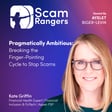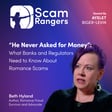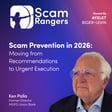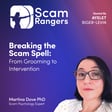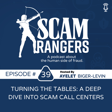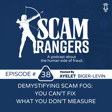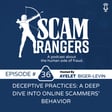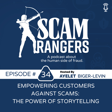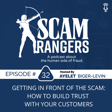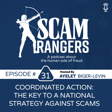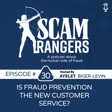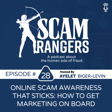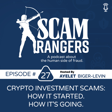
Standing Boldly Against Romance Scams: Empowering Victims on the Path to Recovery, with Cecilie Fjellhøy and Anne Rowe, Co-Founder of LoveSaid
If you are a bank fraud fighter or in law enforcement, you will not want to miss this fascinating episode. Anne and Cecilie both share their personal romance scam stories and how they had to face the realities and aftermath of emotional and financial trauma, as well as judgment from society and authorities. They decided to turn their experience into a bold movement and Founded LoveSaid, a non profit with the goal to support romance scam victims with carefully orchestrated process and tools to bring victims out of the scam and to support them afterwards in navigating the emotional and financial aftermath.
As Cecilie put it in her own words: I'm sure they (bank fraud teams) don't have much time so they just go on the phone and tell the customer "high suspicious activity here". I can imagine how they are saying it and we (the scam victims) refuse to listen and we are cutting them off. If we can have a bank of Ex Victims who've been trained to go in and talk to these victims, we truly believe that we can get there much faster in a better way than police and banks can. We truly see the power of people with experience coming in.
Resources:
Socials:
- Instagram and TikTok :catchthecatfish123
- Facebook:@catchthecatfish
- You Tube: @CatchTheCatfish
- Instagram:lovesaid_org
- TikTok:lovesaid.org
- Facebook: LoveSaid
- Twitter: LoveSaidOrg
- TikTok: lovesaid.org
This podcast is hosted by Ayelet Biger-Levin who spent the last 15 years building technology to help financial institutions authenticate their customers and identify fraud. She believes that when it comes to scams, the story starts well before the transaction. She has created this podcast to talk about the human side of scams, and to learn from people who have decided to dedicate their lives to speaking up on behalf of scam victims and who take action to solve this problem. Be sure to follow her on LinkedIn and reach out to learn about her additional activities in this space. https://www.linkedin.com/in/ayelet-biger-levin/ Also check out https://scamranger.ai if you had received a message that you suspect is a scam
Additional academic research mentioned in the podcast:
Dr Elisabeth Carter’s body of work:
Forensic Linguist and Criminologist
- Carter, E. (2023) Compelled to comply: Exposing the exploitation of communicative relationships by fraudsters to gain and harness compliance from their victims. The British Journal of Criminology.
- Carter, E. (2021) Distort, extort, deceive and exploit: Exploring the inner workings of a romance fraud, The British Journal of Criminology 61(2): 283–302.
- Carter, E. (2015) The anatomy of scam communications: An empirical analysis, Crime, Media, Culture: An International Journal 11(2): 89-103.
- Carter, E. (2015) Laughing matters: A conversation analytic account of the use of laughter by suspects and officers in the police interview, The Essex Graduate Journal of Sociology 50th Anniversary Special Issue 14(1): 99-113.
- Carter, E. (2015) A conversation analytic exploration of laughter in the police interview, SAGE Research Methods January 15: 68-85.
- Carter, E. (2014) When is a lie not a lie? When it's divergent: Examining lies and deceptive responses in a police interview, International Journal of Language and the Law/Linguagem e Direito (1):122-140.
